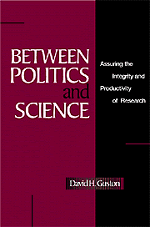Book contents
- Frontmatter
- Contents
- Tables and Figures
- Abbreviations
- Preface
- Introduction: Making Space for Science Policy
- Chapter 1 Science Policy: Structure and Boundaries
- Chapter 2 Understanding the Social Contract for Science
- Chapter 3 Challenges to the Social Contract for Science
- Chapter 4 Assuring the Integrity of Research
- Chapter 5 Assuring the Productivity of Research
- Chapter 6 Between Politics and Science
- Notes
- References
- Index
Chapter 6 - Between Politics and Science
Published online by Cambridge University Press: 14 October 2009
- Frontmatter
- Contents
- Tables and Figures
- Abbreviations
- Preface
- Introduction: Making Space for Science Policy
- Chapter 1 Science Policy: Structure and Boundaries
- Chapter 2 Understanding the Social Contract for Science
- Chapter 3 Challenges to the Social Contract for Science
- Chapter 4 Assuring the Integrity of Research
- Chapter 5 Assuring the Productivity of Research
- Chapter 6 Between Politics and Science
- Notes
- References
- Index
Summary
It is no longer enough to regard research grants as entitlements. … [T]he public supports research, but it is also demanding accountability. The “trust us, we're smart” approach no longer works. … A fine line exists between the role of Congress as stewards of the public purse and the micromanagement of the programs we fund. On the one hand we want to ensure that the departments and agencies that propose and manage science programs are held to high standards; on the other hand we don't want to create a situation in which Members of Congress are telling scientists how to do their research.
– Representative Robert S. Walker (R-PA, retired), former chairperson of the House Science Committee (Walker 1997: 6).Introduction
In this intensively technological age, politicians rely on science for both material and ideological support. The material contributions of science to politics depend in part on sound judgments and conclusions. A hypothetical AIDS vaccine is equally useless for easing human suffering and for settling policy conflicts if clinical data supporting its safety and efficacy have been falsified. Ideological support for politics also rests on the integrity of scientists. A community of white-coated rascals cannot be the model of the nonviolent formation of consensus that legitimates democratic politics. If the scientific community cannot regulate the conduct of its members, the support it provides to politics can evaporate and, with it, the reciprocal support politics provides for science.
Similarly, research investments may be difficult to sustain if technological benefits are not continually and visibly forthcoming.
- Type
- Chapter
- Information
- Between Politics and ScienceAssuring the Integrity and Productivity of Reseach, pp. 138 - 164Publisher: Cambridge University PressPrint publication year: 2000



